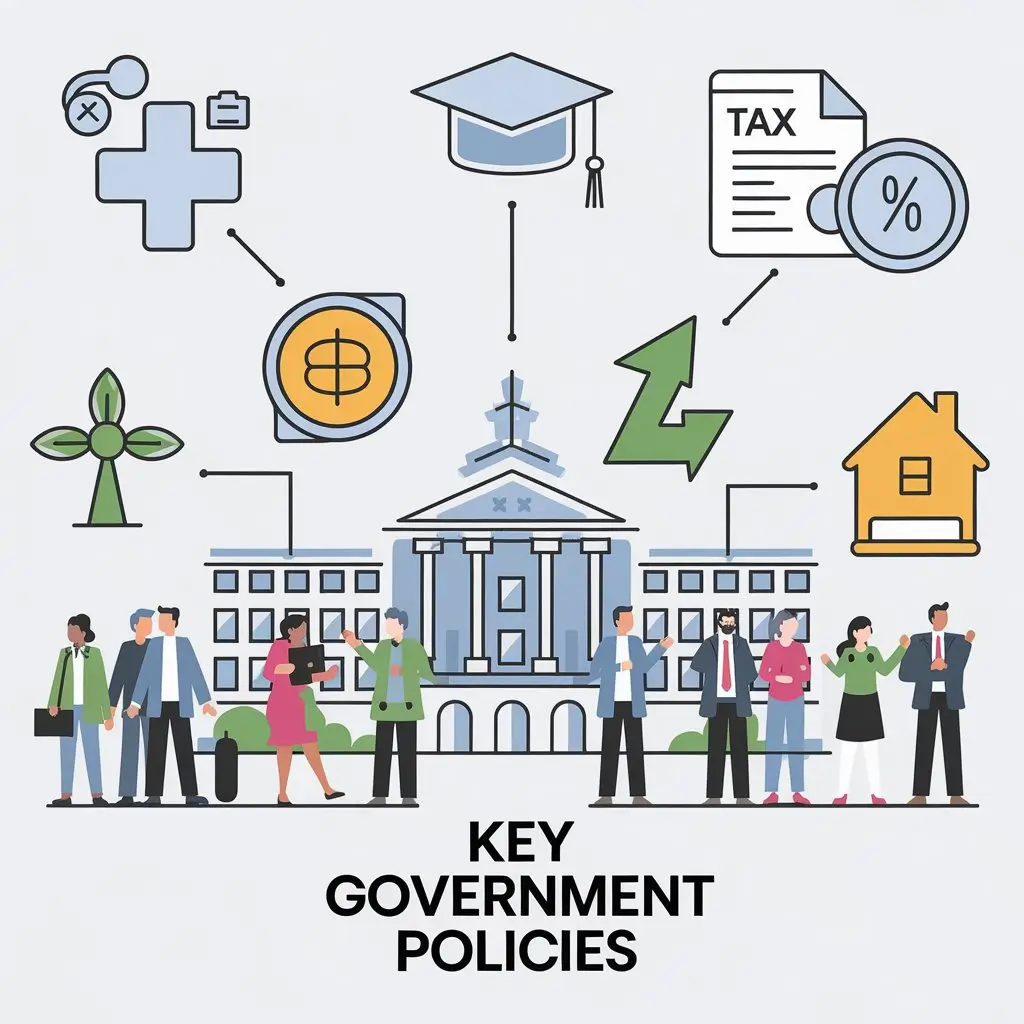Introduction
10 key Government policies shape every aspect of our lives, from the economy to education and healthcare. Yet, understanding them can feel overwhelming with all the jargon and political talk. This blog will break down 10 key government policies that affect you. We will make the info digestible, relatable, and actionable. This guide will clarify tax changes, healthcare reforms, and new education laws. We’ll also explore a list of government policies and highlight current policy issues affecting today’s world.
1. What Are Government Policies?
Government policies are decisions and actions by governments. They shape laws, regulations, and programs. These policies are designed to address societal issues and reflect the government’s priorities. Some policies focus on economic stability. Others aim to improve quality of life through healthcare, education, or social welfare reforms. The list of government policies is always changing. It’s due to political, social, and economic challenges.
2. Why Are Government Policies Important?
Government policies are critical because they dictate how society operates. They affect our day-to-day lives in numerous ways:
- They shape job opportunities.
- Influence the cost of living through tax regulations.
- Affect access to essential services like healthcare and education.
Essentially, policies reflect the government’s vision for the future of the country and its citizens. It’s vital for individuals and businesses to understand current policy issues. These policies can have both immediate and long-term effects.
3. Key Government Policies You Should Know
Let’s dive into some of the most important policies impacting the world today:
1. Healthcare Policies
- Affordable Care Act (ACA): Aims to increase health insurance coverage and reduce healthcare costs.
- Medicare: This is a federal health insurance program designed for older adults and specific individuals with disabilities.
- Medicaid: Provides healthcare coverage for low-income individuals and families.
2. Education Policies
- No Child Left Behind (NCLB): Focuses on accountability and standardized testing in public schools.
- Every Student Succeeds Act (ESSA): Replaces NCLB, granting states more flexibility in education policy.
3. Environmental Policies
- Clean Air Act: Regulates air pollution and emissions.
- Clean Water Act: Protects water quality in the United States.
4. Criminal Justice Policies
- Three Strikes Law: Mandates life imprisonment for certain repeat offenders.
- First Step Act: Aims to reform the federal prison system and reduce recidivism.
5. Economic Policies
- Federal Reserve’s Monetary Policy: Manages the money supply to control inflation and unemployment.
- Tax Cuts and Jobs Act: Significant tax reform that reduces corporate and individual tax rates.
6. Immigration Policies
- DACA (Deferred Action for Childhood Arrivals): Protects eligible undocumented immigrants brought to the U.S. as children.
- Border Wall Initiative: Aims to secure the U.S.-Mexico border.
7. Social Welfare Policies
- Social Security: Provides financial support to retirees, disabled individuals, and survivors.
- Temporary Assistance for Needy Families (TANF): Offers financial assistance to low-income families.
8. Civil Rights Policies
- Civil Rights Act of 1964: Prohibits discrimination based on race, color, religion, sex, or national origin.
- Americans with Disabilities Act (ADA): Ensures equal opportunities for individuals with disabilities.
9. Foreign Policy
- Monroe Doctrine: Asserts U.S. dominance in the Western Hemisphere.
- North Atlantic Treaty Organization (NATO): A military alliance between North American and European countries.
10. Energy Policies
- Renewable Energy Standards: Encourage the use of renewable energy sources.
- Keystone XL Pipeline: An oil pipeline project with significant environmental and economic implications.
These policies reflect the many areas where government action can affect society. They include health, education, the environment, and justice. Also, the economy, immigration, social welfare, civil rights, foreign relations, and energy management.

4. Key Insights Into Government Policies
Government policies can be complicated. But, knowing the key ones can provide insight. They shape the economy and society. Here are a few critical insights:
5.1 Economic Impact
Most government policies aim for an economic goal. They seek to grow the economy, redistribute wealth, or control inflation. Keeping an eye on tax reforms and fiscal policy can provide a clearer picture of future economic stability.
5.2 Political Landscape
Changes in political leadership can result in drastic policy shifts. For instance, a new government might reverse healthcare reforms or introduce new welfare policies.
5.3 Long-Term Consequences
While many policies address immediate issues, they can also have long-term consequences. Today’s environmental policies may prevent disasters decades from now. But, short-term tax cuts could lead to future deficits.
Conclusion
The key Government policies play a crucial role in shaping the world around us. These policies affect our daily lives. They cover healthcare, education, tax reforms, and environmental protections. Knowing current policy issues and government policies can help you. It will help you navigate changes and understand their effects on you.
It’s essential to engage in the political process, understand these policies, and advocate for the ones that reflect your values. After all, these decisions shape not only your future but that of generations to come.e.

